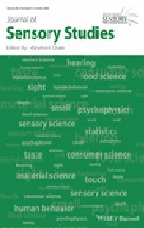Risk of hedonic bias in sensory co-elicitations: Comparison of CATA questions and applicability ratings
Dublin Core
Título
Risk of hedonic bias in sensory co-elicitations: Comparison of CATA questions and applicability ratings
Tema
EVALUACION SENSORIAL
2.11.0.0
2.11.0.0
2.11.0.0
2.11.0.0
RESPUESTAS HEDONICAS
2.11.0.0
2.11.0.0
2.11.0.0
2.11.0.0
CATA
2.11.0.0
2.11.0.0
2.11.0.0
2.11.0.0
BIBLIOGRAFIA NACIONAL QUIMICA
2.11.0.0
2.11.0.0
2.11.0.0
2.11.0.0
2020
2.11.0.0
2.11.0.0
2.11.0.0
2.11.0.0
Abstract
Co-elicitation of hedonic responses and sensory responses is now common. Against
this background, this research compared the risk of hedonic bias from sensory checkall-that-apply (CATA) questions and sensory term ratings from unstructured line scales (RQ1) and evaluated if the risk of hedonic bias is independent of the sensory
terms of the CATA question (RQ2). Seven studies with 137–293 participants each were conducted, using different product categories. Between-subjects experimental designs were used and allocated consumers to one experimental condition (EC). For RQ1, these were hedonic, hedonic immediately followed by a CATA question, and
hedonic immediately followed by a rating of term applicability (“not at all” to “extremely”). In RQ2, both ECs involved hedonic ratings followed by a CATA question, but the sensory terms differed. Results showed a significant effect of EC on
hedonic ratings in three of five studies for RQ1, suggesting that hedonic bias may or may not occur. For RQ2, the terms of the CATA question influenced hedonic ratings in two of three studies, and a negative hedonic effect was seen when CATA terms drew attention to particular characteristics of individual samples. Collectively, the results suggest that likelihood of bias depends on interactions between product category, samples, and terms.
Practical applications
Results from the present work suggest that hedonic bias in sensory co-elicitations
using CATA questions and scales may occur depending on the type of sensory attributes
considered in the study. The consideration of terms that trigger attention to specific sensory attributes of the samples may lead to changes in hedonic ratings.
Rating scales appear more likely to be associated with hedonic bias compared to CATA questions due to their more analytic approach to sample evaluation.
this background, this research compared the risk of hedonic bias from sensory checkall-that-apply (CATA) questions and sensory term ratings from unstructured line scales (RQ1) and evaluated if the risk of hedonic bias is independent of the sensory
terms of the CATA question (RQ2). Seven studies with 137–293 participants each were conducted, using different product categories. Between-subjects experimental designs were used and allocated consumers to one experimental condition (EC). For RQ1, these were hedonic, hedonic immediately followed by a CATA question, and
hedonic immediately followed by a rating of term applicability (“not at all” to “extremely”). In RQ2, both ECs involved hedonic ratings followed by a CATA question, but the sensory terms differed. Results showed a significant effect of EC on
hedonic ratings in three of five studies for RQ1, suggesting that hedonic bias may or may not occur. For RQ2, the terms of the CATA question influenced hedonic ratings in two of three studies, and a negative hedonic effect was seen when CATA terms drew attention to particular characteristics of individual samples. Collectively, the results suggest that likelihood of bias depends on interactions between product category, samples, and terms.
Practical applications
Results from the present work suggest that hedonic bias in sensory co-elicitations
using CATA questions and scales may occur depending on the type of sensory attributes
considered in the study. The consideration of terms that trigger attention to specific sensory attributes of the samples may lead to changes in hedonic ratings.
Rating scales appear more likely to be associated with hedonic bias compared to CATA questions due to their more analytic approach to sample evaluation.
2.11.0.0
2.11.0.0
2.11.0.0
2.11.0.0
Autor
Jaeger, Sara R.
Jin, David
2.11.0.0
2.11.0.0
2.11.0.0
2.11.0.0
Roigard, Christina M.
2.11.0.0
2.11.0.0
2.11.0.0
2.11.0.0
Le Blond, Marie
2.11.0.0
2.11.0.0
2.11.0.0
2.11.0.0
Ares, Gastón
2.11.0.0
2.11.0.0
2.11.0.0
2.11.0.0
Fuente
Journal of Sensory Studies v.35, 2020. -- p.1-10.--e12601
2.11.0.0
2.11.0.0
2.11.0.0
2.11.0.0
Editor
Wiley
2.11.0.0
2.11.0.0
2.11.0.0
2.11.0.0
Fecha
2020
2.11.0.0
2.11.0.0
2.11.0.0
2.11.0.0
Derechos
Información sobre Derechos de Autor (Por favor lea este aviso antes de abrir los documentos u objetos) La legislación uruguayaprotege el derecho de autor sobre toda creación literaria, científica o artística, tanto en lo que tiene que ver con sus derechos morales, como en lo referente a los derechos patrimoniales con sujeción a lo establecido por el derecho común y las siguientes leyes (LEY 9.739 DE 17 DE DICIEMBRE DE 1937 SOBRE PROPIEDAD LITERARIA Y ARTISTICA CON LAS MODIFICACIONES INTRODUCIDAS POR LA LEY DE DERECHO DE AUTOR Y DERECHOS CONEXOS No. 17.616 DE 10 DE ENERO DE 2003, LEY 17.805 DE 26 DE AGOSTO DE 2004, LEY 18.046 DE 24 DE OCTUBRE DE 2006 LEY 18.046 DE 24 DE OCTUBRE DE 2006) ADVERTENCIA - La consulta de este documento queda condicionada a la aceptación de las siguientes condiciones de uso: Este documento es únicamente para usos privados enmarcados en actividades de investigación y docencia. No se autoriza su reproducción con fines de lucro. Esta reserva de derechos afecta tanto los datos del documento como a sus contenidos. En la utilización o cita de partes debe indicarse el nombre de la persona autora.
2.11.0.0
2.11.0.0
2.11.0.0
2.11.0.0
Formato
Pdf
2.11.0.0
2.11.0.0
2.11.0.0
2.11.0.0
Idioma
Inglés
2.11.0.0
2.11.0.0
2.11.0.0
2.11.0.0
Tipo
Artículo
2.11.0.0
2.11.0.0
2.11.0.0
2.11.0.0
Identificador
https://doi.org/10.1111/joss.12601
2.11.0.0
2.11.0.0
2.11.0.0
2.11.0.0
Document Item Type Metadata
Original Format
Pdf
2.11.0.0
2.11.0.0
2.11.0.0
- Fecha de agregación
- October 9, 2020
- Colección
- Bibliografía Nacional Química
- Tipo de Elemento
- Document
- Etiquetas
- CATA, Evaluación sensorial, Respuestas hedónicas
- Citación
- Jaeger, Sara R., “Risk of hedonic bias in sensory co-elicitations: Comparison of CATA questions and applicability ratings,” RIQUIM - Repositorio Institucional de la Facultad de Química - UdelaR, accessed July 26, 2024, https://riquim.fq.edu.uy/items/show/6144.
- Archivos

